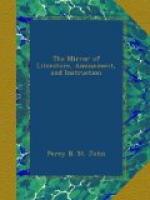(For the Mirror.)
In 1749, a considerable number of gold coins were discovered on the top of Karnbre, in Cornwall, which are clearly proved to have belonged to the ancient Britons. The figures that were first stamped on the coins of all nations were those of oxen, horses, sheep, &c. It may, therefore, be concluded, that the coins of any country which have only the figures of cattle stamped on them, and perhaps of trees, representing the woods in which their cattle pastured,—were the most ancient coins of the country. Some of the gold coins found at Karnbre, and described by Dr. Borlase, are of this kind, and may be justly esteemed the most ancient of our British coins. Sovereigns soon became aware of the importance of money, and took the fabrication of it under their own direction, ordering their own heads to be impressed on one side of the coins, while the figure of some animal still continued to be stamped on the other. Of this kind are some of the Karnbre coins, with a royal head on one side, and a horse on the other. When the knowledge and use of letters were once introduced into any country, it would not be long before they appeared on its coins, expressing the names of the princes whose heads were stamped on them. This was a very great improvement in the art of coining, and gave an additional value to the money, by preserving the memories of princes, and giving light to history. Our British ancestors were acquainted with this improvement before they were subdued by the Romans, as several coins of ancient Britain have very plain and perfect inscriptions, and on that account merit particular attention.
Ina.
* * * * *
ANIMAL FOOD.
(For the Mirror.)
It is generally allowed, that a profusion of animal food has a tendency to vitiate and debase the nature and dispositions of men; notwithstanding, the lovers of flesh urge the names of many of the most eminent in literature and science, in opposition to this assertion.
Plutarch attributed the stupidity of his countrymen, the Boeotians, to the profusion of animal food which they consumed, and even now, our lovely, soup drinking, coffee sipping friends on the continent, attribute the saturnine, melancholy, and bearish dispositions of John Bull, to his partiality for,
“The famous roast-beef of Old England.”
A facetious, philosophical, friend of mine, lately amused me with some remarks, on the nature and properties of different kinds of food. “We know,” said he, “that one herb produces this effect, and another that; that different species and varieties of plants have different virtues; and, why may we not infer that the same rule extends to animated nature; that our fish, flesh, and fowl, not only serve as nutriment, but that each kind possesses peculiar and individual properties.”




